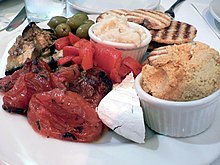Skordalia
 | |
| Type | Puree |
|---|---|
| Region or state | Greece |
| Main ingredients | Garlic |
| Ingredients generally used | Potatoes, walnuts, almonds, bread, olive oil |
Skordalia or skordhalia or skorthalia (Greek: σκορδαλιά [skorðaˈʎa], also called αλιάδα, aliada/aliatha) is a thick purée in Greek cuisine, made of garlic in a base of potatoes, walnuts, almonds or liquid-soaked stale bread mixed with olive oil in to make a smooth emulsion, to which some vinegar is added.[1][2] It is usually made in a mortar and pestle. Skordalia is served as a sauce, side dish, or dip.
Overview
[edit]

Skordalia is the modern equivalent of ancient skorothalmi.[1] The name, on the other hand, may be a pleonastic compound of Greek σκόρδο [ˈskorðo] 'garlic' and Italian agliata [aʎˈʎaːta] 'garlicky'.[3]
Skordalia is usually served with batter-fried fish (notably salt cod, μπακαλιάρος), fried vegetables (notably eggplant and zucchini), poached fish, or boiled vegetables (notably beets). It is sometimes used as a dip.[citation needed]
Variants of skordalia may include eggs as the emulsifier, omitting or reducing the bulk ingredient, which makes for a result similar to the Provençal aïoli and Catalan allioli. In the Ionian Islands, cod stock and lemon are usually added instead of vinegar, and then skordalia is eaten as a main dish.[citation needed]
See also
[edit]- Agliata – an Italian garlic sauce
- Aioli – a Provençal and Catalan garlic sauce
- Garlic sauce
- Tzatziki – a sauce of cucumber, garlic, and yoghurt
- Bread sauce
- List of bread dishes
- List of dips
- List of garlic dishes
- List of sauces
References
[edit]- ^ a b Davidson, Alan (21 September 2006). The Oxford Companion to Food. OUP Oxford. ISBN 9780191018251 – via Google Books.
- ^ Guardian newspaper: skordalia recipe with potato for body and lemon for sharpness
- ^ Babiniotis, Λεξικό της Νέας Ελληνικής Γλώσσας


 French
French Deutsch
Deutsch